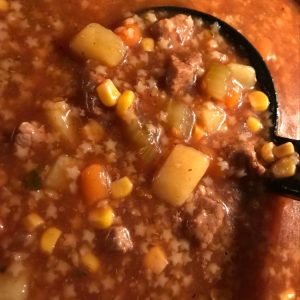
Instructions:
Step 1
Heat a non-stick skillet over medium heat.
Step 2
Add the beef pieces and brown them on all sides, stirring frequently.
Step 3
This step adds a rich, deep flavor to the soup, though it is optional if you’re short on time.
Step 4
Once browned, transfer the beef to a slow cooker.
Step 5
To the slow cooker, add the sliced carrots, celery, onions, mushrooms, beef base, garlic (if using), bay leaf, and water. Stir everything together.
Step 6
Set the slow cooker to cook on high for 1 hour to bring the flavors together.
Step 7
After an hour, add the pearl barley to the soup and stir. Reduce the heat to low and continue cooking for an additional 4–6 hours (or until the beef and vegetables are tender).
Step 8
Season the soup with salt and pepper to taste.
Step 9
Discard the bay leaf before serving.
Step 10
Pro Tips for Making Beef and Barley Soup:
Use a Tough Cut of Meat: Chuck roast or shoulder is ideal for this soup. These cuts are tougher but become incredibly tender when cooked low and slow, making them perfect for soups like this.
Browning the Beef: While optional, browning the beef adds a deeper, richer flavor to the soup. If you’re short on time, you can skip this step and still get great results.
Adjust the Barley: Pearl barley can soak up a lot of liquid. If you like a thicker soup, add less water, or if you prefer a brothier consistency, add a little more. You can also cook the barley separately and add it to the soup just before serving.
Let it Sit: This soup tastes even better the next day! If you have time, let it sit for a few hours or overnight in the fridge to let the flavors meld together.
Freezing Tip: This soup freezes well, so feel free to make a double batch and freeze half for a rainy day. Just let it cool completely before transferring to freezer-safe containers.
Nutritional Information (per serving, approx.):
Calories: 300–350 kcal
Protein: 30g
Carbohydrates: 30g
Fiber: 6g
Fat: 12g
Saturated Fat: 4g
Cholesterol: 70mg
Sodium: 700mg (varies based on beef base used)
Potassium: 800mg
Vitamin A: 120% of the Daily Value (from carrots)
Vitamin C: 15% of the Daily Value (from vegetables)
Iron: 20% of the Daily Value